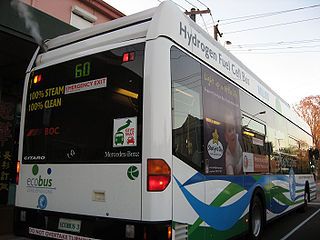Hydrogen as a Device for Energy Storage

The US, even with a “smart grid” isn’t likely to get more than 16 hours of effective solar power in a day. Large successful manufacturers are going to run 24 hours a day and therefore, going to need 24 hours’ worth of power a day. Not to mention the home used power for the idiot box, the stereo, the fridge and the heater when it gets cold that the average American will insist on. Say what you want, the wind isn’t consistent enough to provide adequate power for the entire night. So, what if we used hydrogen gas to power the stand alone power stations that we will inevitably need?
Because the sun’s presence in the sky and human activity are so nicely aligned, there is no reason to store solar energy. Obviously, that wouldn’t be the case if we were going to power the whole world with only solar, but we’re not. However, we will eventually need storage, for example, when we want to integrate a huge amount of wind into the grid-mix.
But hydrogen won’t play a role in that. The point of hydrogen is that it’s portable, like gasoline, and like batteries are becoming as we improve their energy densities. But, unlike gasoline in our gas tanks and electricity in our batteries, we do not (and will not) have a fuel delivery infrastructure to dispense hydrogen.

The problem with hydrogen for large scale energy storage is the poor round trip efficiency (RTE) you get from first electrolyzing water and then running the hydrogen through a fuel cell. The RTE for Hydrogen electrolysis/fuel cell is less than 50% (half the energy is lost.)
For comparison, pumped hydro power typically has a 75% RTE, while most batteries (including large-scale flow batteries) are typically in the 70-90% range.
See these charts I put together a few years ago:
http://www.altenergystocks.com/archives/2009/06/large_scale_energy_storage_technologies_compared_1.html
Tom
I certainly agree with your analysis, although I would say 50% RTE, with current technologies, is probably a bit optimistic, just the electrolysis and regeneration using H-fuel cells would struggle to achieve this (e.g. 80% + 60% -> 48% RTE). Furthermore; for meaningful use intermediate storage will be required, not only loosing more energy for compression, cooling etc., but also requires sophisticated storage technologies; high pressure vessels, cryogenic vessels or exotic materials.
I believe that synthetic carbon (Green Coal), being a solid, offers a much better option which, when combined with a DCFC (direct carbon fuel cell), gives a generation efficiency of about 80%, even higher if operated in combined cycle mode. This should more than offset the carbon production costs/losses, by whatever method used, but importantly the energy required for storage is inconsequential, even for multi TWh quantities; this is highly unlikely to be economical with H or any other existing storage mechanism.
Tom
I certainly agree with your analysis, although I would say 50% RTE, with current technologies, is probably a bit optimistic, just the electrolysis and regeneration using H-fuel cells would struggle to achieve this (e.g. 80% + 60% 48% RTE). Furthermore; for meaningful use intermediate storage will be required, not only loosing more energy for compression, cooling etc., but also requiring sophisticated storage technologies; high pressure vessels, cryogenic vessels or exotic materials.
I believe that synthetic carbon (Green Coal), being a solid, offers a much better option which, when combined with a DCFC (direct carbon fuel cell), gives a generation efficiency of about 80%, even higher if operated in combined cycle mode. This should more than offset the carbon production costs/losses, by whatever method used, but importantly the energy required for storage is inconsequential, even for multi TWh quantities; this is highly unlikely to be economical with H or any other existing storage mechanism.
I do see a merit in treating hydrogen as Intra-day currency and let that Idea not get sidelined by efficiency alone and at 50% and considering New revelations about reducing the energy foot for Vehicles; it deserved a Gold status.
Jayesh: But why use Hydrogen when there are other options which will store electricity more efficiently?